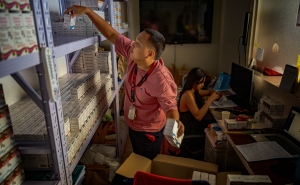What Guaranteed Income Means for Public Health
Targeted cash assistance can be a health inequity intervention.

Baltimore Mayor Brandon Scott has joined the ranks of 60 mayors across the U.S. piloting guaranteed income programs—financial assistance initiatives that aim to improve health equity by giving unrestricted cash payments to residents living at or below the poverty line.
The Baltimore Young Families Success Fund (BYFSF) will give $1,000 a month for 24 months to 200 randomly selected 18- to 24-year-old parents living in Baltimore City. Lorraine T. Dean, ScD, an associate professor in Epidemiology, working together with PhD student Sevly Snguon, MPH, through Dean’s research team, will help evaluate BYFSF’s impact on public health. Poverty, they say, is a policy choice.
What is guaranteed income?
Sevly Snguon: Guaranteed income is a targeted, unconditional cash transfer program with no requirements to participate. It's unrestricted cash. The money provided can be used for anything. It's recurring—given monthly, quarterly, or annually.
Guaranteed income provides people with autonomy to use the dollars they spend. It's giving people power and time to determine what their needs are.
Who receives guaranteed income?
SS: Guaranteed income is specific to particular populations. It's not universal. There are eligibility requirements for you to be in the program, but the program doesn't require you to do something [such as work] to participate.
Lorraine Dean: That it goes to a targeted group of people is what makes it a health equity intervention. Equality would be giving everybody the same thing, but that could still preserve disparities—whereas equity is about targeting people who really need it and bringing those people up. We see guaranteed income as a way of bringing people to a certain level of need, as opposed to giving everyone everything without removing disparities.
Why is guaranteed income a public health intervention?
LD: Guaranteed income falls in line with all of the studies we've seen for over 100 years that suggest that as people's economic standing improves, their health also improves.
SS: [Guaranteed income] targets a lot of the social determinants of health. That's what we're trying to conceptualize in our research: What are the direct health effects?
For example, poverty can cause stress, anxiety, and depression, which have an impact on pregnancies. Baby's First Years, a randomized controlled study across four U.S. states, found more brain activity in babies in households that received an intervention of $1,000 a month.
Income plays a role in critical periods of people's lives. We want to make sure that people can get the access to cash they need at those times.
How will you track how people spend guaranteed income?
LD: In the BYFSF, they'll be using participant surveys every six months to see how much people are spending on things like childcare or housing—the social determinants of health.
Tracking won't be granular, to preserve people’s autonomy to use this money for whatever they want to, without judgment. But if someone shopped at a grocery store, their purchase would be listed as groceries; if someone bought gas, that'll be listed as gas.
SS: At the Stockton Economic Empowerment Demonstration (SEED), researchers reported that people used most of their monthly money—35%—on food. Approximately 25% went to recreational shopping and merchandise.
That's what the quantitative data show. But when we dive deeper, we see that money is being used for things that are memorable, like buying birthday cakes or prom dresses. We’re giving people a choice to purchase things that give them the life experiences that shape being human. It's important that people who have experienced deprivation are finally able to meet these needs.
What are some misperceptions about guaranteed income?
SS: [Society] is fixated on asking what low-income people are spending their money on, when we never ask what wealthy people are spending their money on. When people are asked, “What do you think people will spend their guaranteed income on?” they say, “I think they'll use it on drugs or alcohol.”
The SEED study found that less than 1% of the cash went to tobacco and alcohol.
If you asked those same people what they would use guaranteed income on, they say, “I’d use it for food, clothes, gas, utilities, etc.”
The question becomes: If you can see that for yourself, why can’t you see that for others? It's a deserving-ness narrative. People don't need to prove that they're deserving of guaranteed income. Emerging research is countering a lot of people's assumptions.
LD: Another misconception is that people won't get jobs or that guaranteed income is making work optional. Studies have examined that idea, and when they controlled for the changing labor market supply, they found no net losses in terms of people working. The evidence suggested that in the cases found where people did work less, it was because they’d gone back to school, had a child and needed to stay home, or were transitioning from working multiple jobs to fewer, or to one.
Supplemental income is not enough to live on. Most people are still going to have to work.
Have there been federal programs like guaranteed income?
SS: I would say the only modern program that mirrored guaranteed income was the expansion of the child tax credit, which basically cut child poverty in half. When the Build Back Better Act wasn't passed, we saw that families of color were disproportionately impacted by the subsequent cuts. That speaks to how poverty is a policy choice.
Are you optimistic that equity, rather than poverty, will become the policy choice?
LD: Now more than ever, people are much more sympathetic and understanding that families just need help.
During the pandemic, we all got stimulus checks or child tax credits. I think the U.S. is in a better place than ever in terms of something like guaranteed income becoming policy. But policy takes time. It could be another 10 or 15 years before we see widespread uptake.
SS: I am hopeful that there will be a movement to relax program requirements that are rooted in dehumanizing people and undermining human dignity, but I think health research is what's going to cement it. It's going to tell the story of how [guaranteed income] improves lives and how it could be an impactful public health intervention.
If we want to uplift people and reduce health disparities, we can do that through unconditional cash transfers.
LD: We should also remember that guaranteed income won't be a solution for everything. We believe it's going to have health impacts, but it's not going to solve every health challenge. We should see guaranteed income, instead, as a patching of gaps in the existing safety net programs.
Morgan Coulson is an editorial specialist at the Johns Hopkins Bloomberg School of Public Health.





